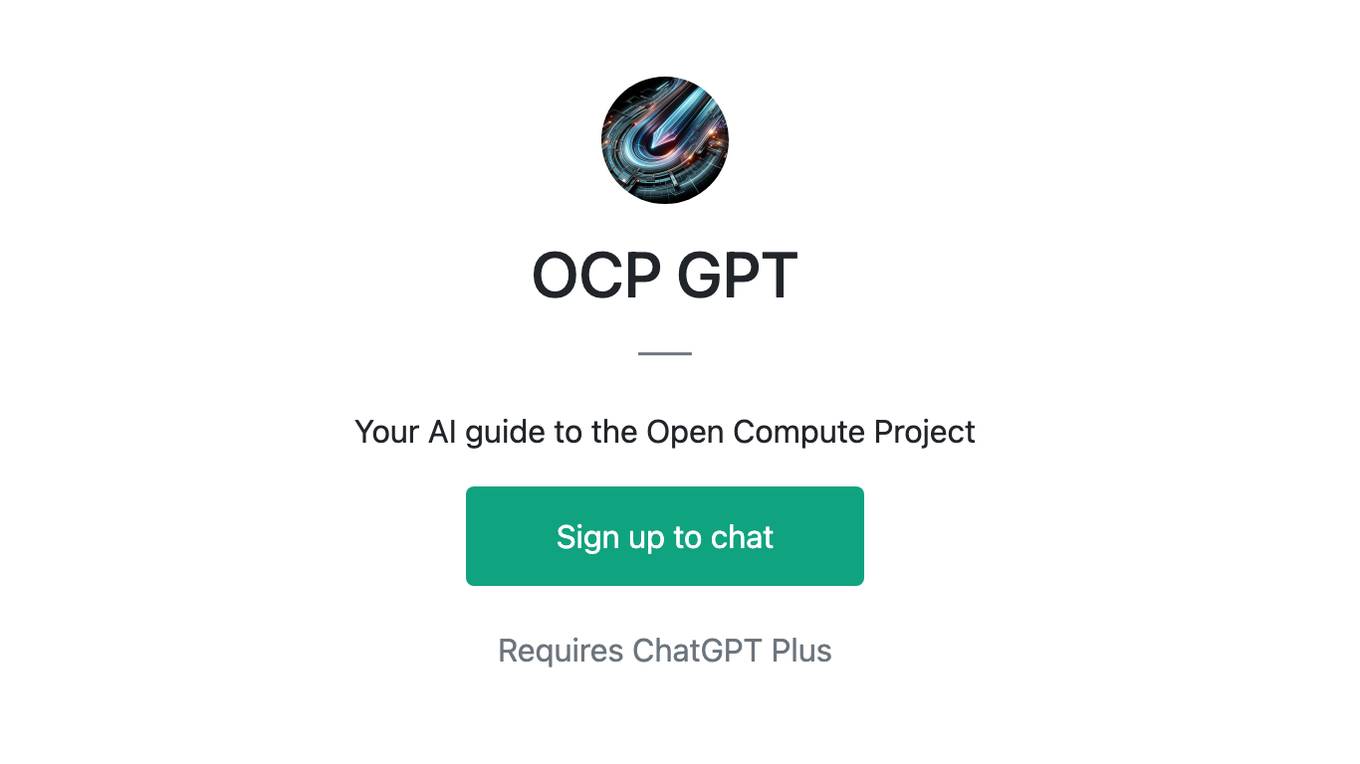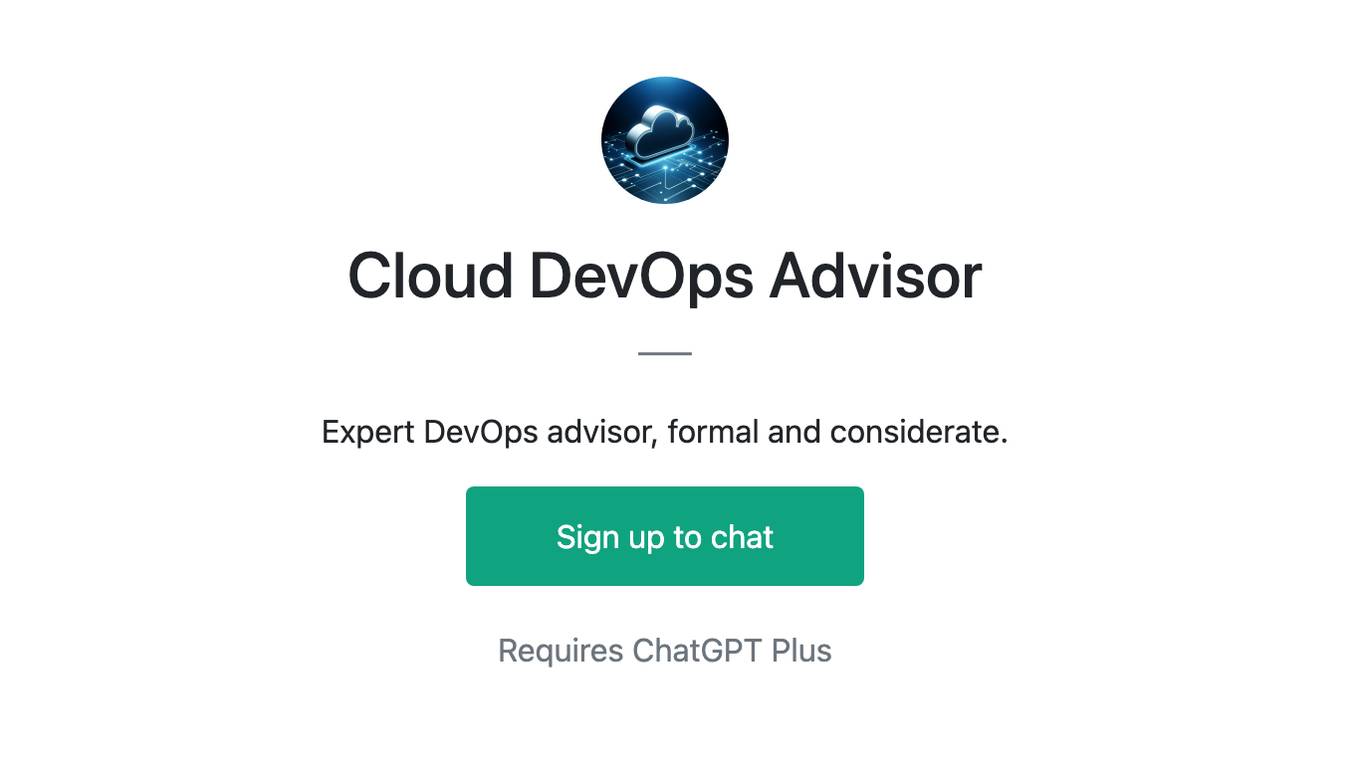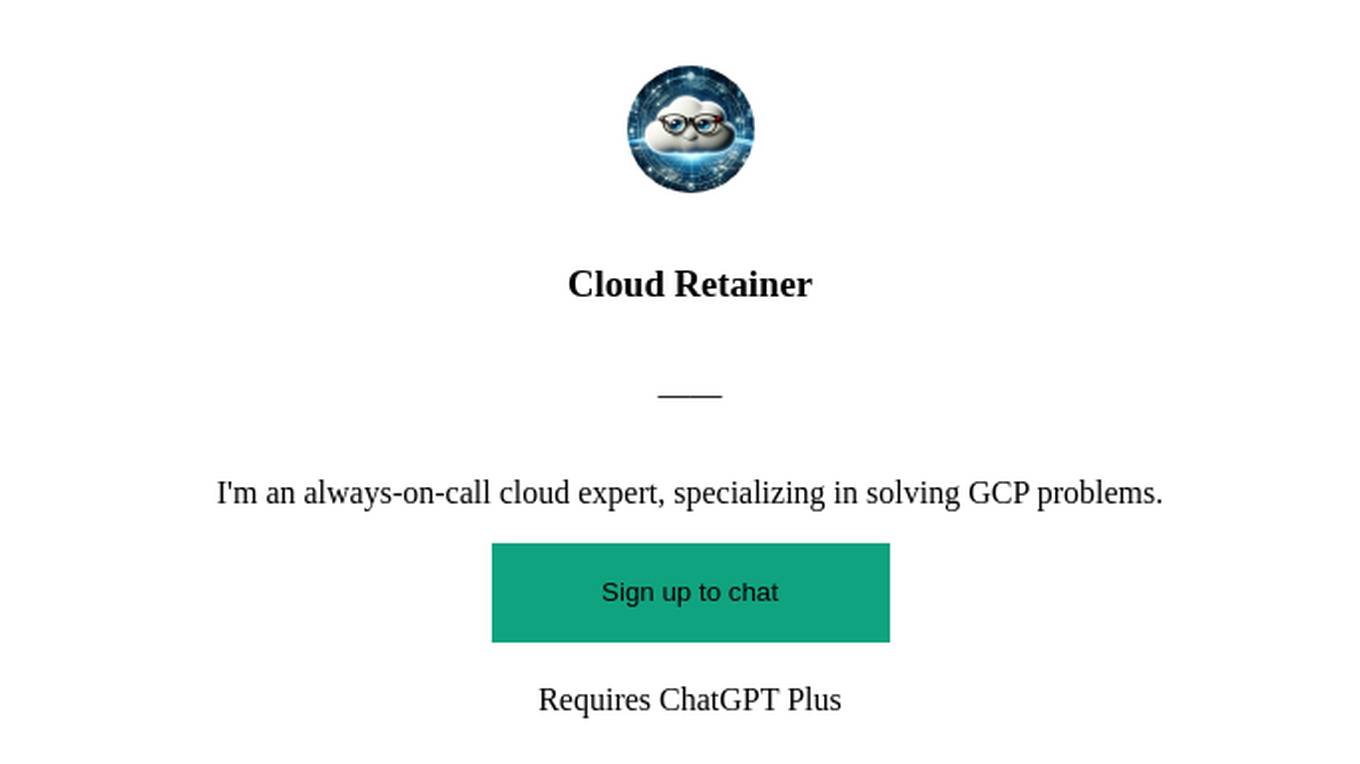Best AI tools for< Cloud Researcher >
Infographic
20 - AI tool Sites
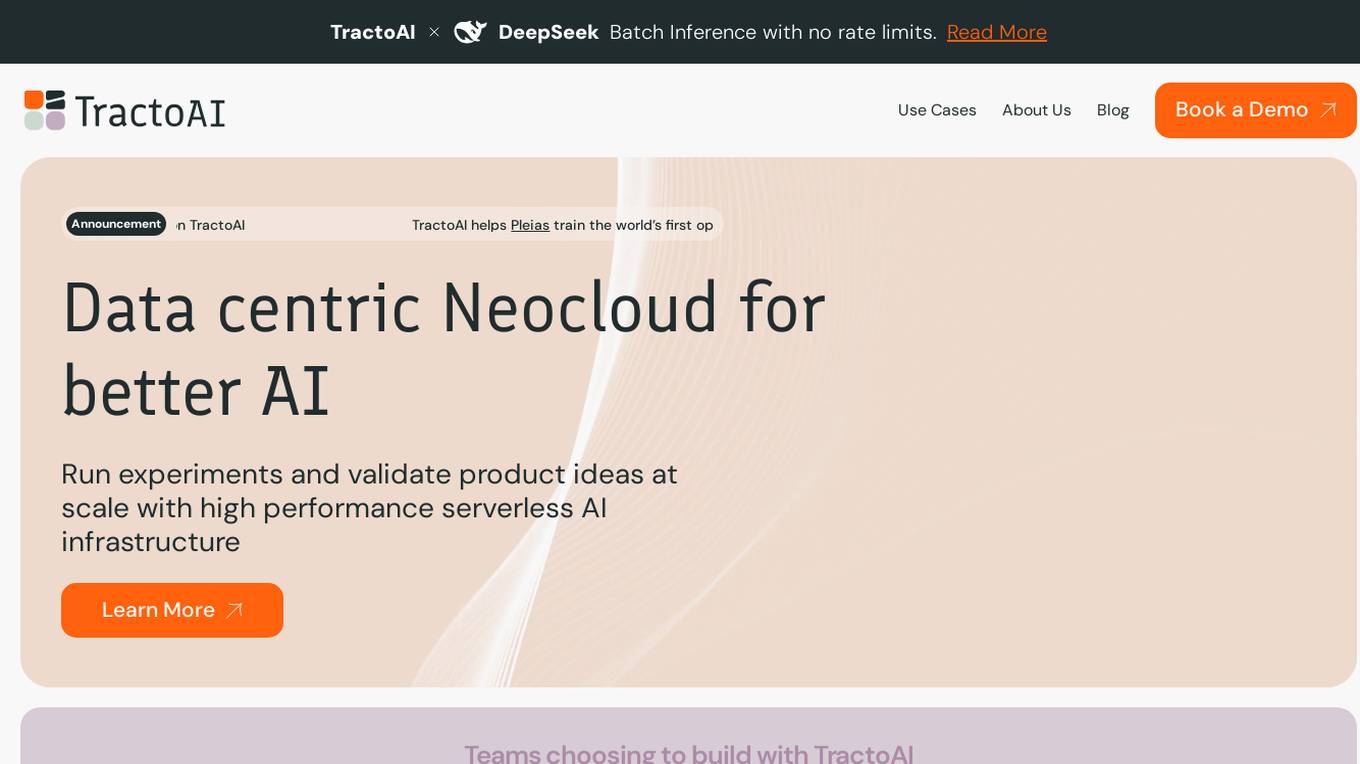
TractoAI
TractoAI is an advanced AI platform that offers deep learning solutions for various industries. It provides Batch Inference with no rate limits, DeepSeek offline inference, and helps in training open source AI models. TractoAI simplifies training infrastructure setup, accelerates workflows with GPUs, and automates deployment and scaling for tasks like ML training and big data processing. The platform supports fine-tuning models, sandboxed code execution, and building custom AI models with distributed training launcher. It is developer-friendly, scalable, and efficient, offering a solution library and expert guidance for AI projects.

HUAWEI Cloud Pangu Drug Molecule Model
HUAWEI Cloud Pangu is an AI tool designed for accelerating drug discovery by optimizing drug molecules. It offers features such as Molecule Search, Molecule Optimizer, and Pocket Molecule Design. Users can submit molecules for optimization and view historical optimization results. The tool is based on the MindSpore framework and has been visited over 300,000 times since August 23, 2021.
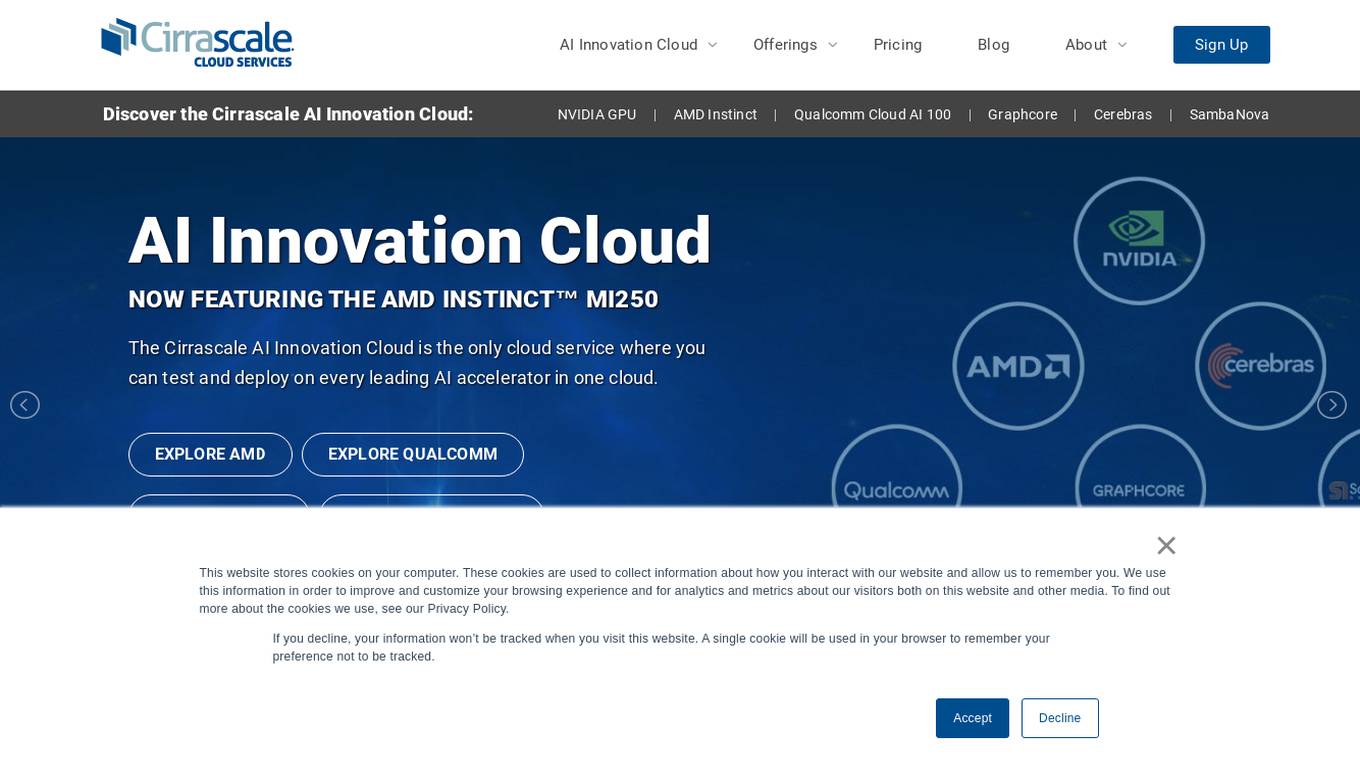
Cirrascale Cloud Services
Cirrascale Cloud Services is an AI tool that offers cloud solutions for Artificial Intelligence applications. The platform provides a range of cloud services and products tailored for AI innovation, including NVIDIA GPU Cloud, AMD Instinct Series Cloud, Qualcomm Cloud, Graphcore, Cerebras, and SambaNova. Cirrascale's AI Innovation Cloud enables users to test and deploy on leading AI accelerators in one cloud, democratizing AI by delivering high-performance AI compute and scalable deep learning solutions. The platform also offers professional and managed services, tailored multi-GPU server options, and high-throughput storage and networking solutions to accelerate development, training, and inference workloads.
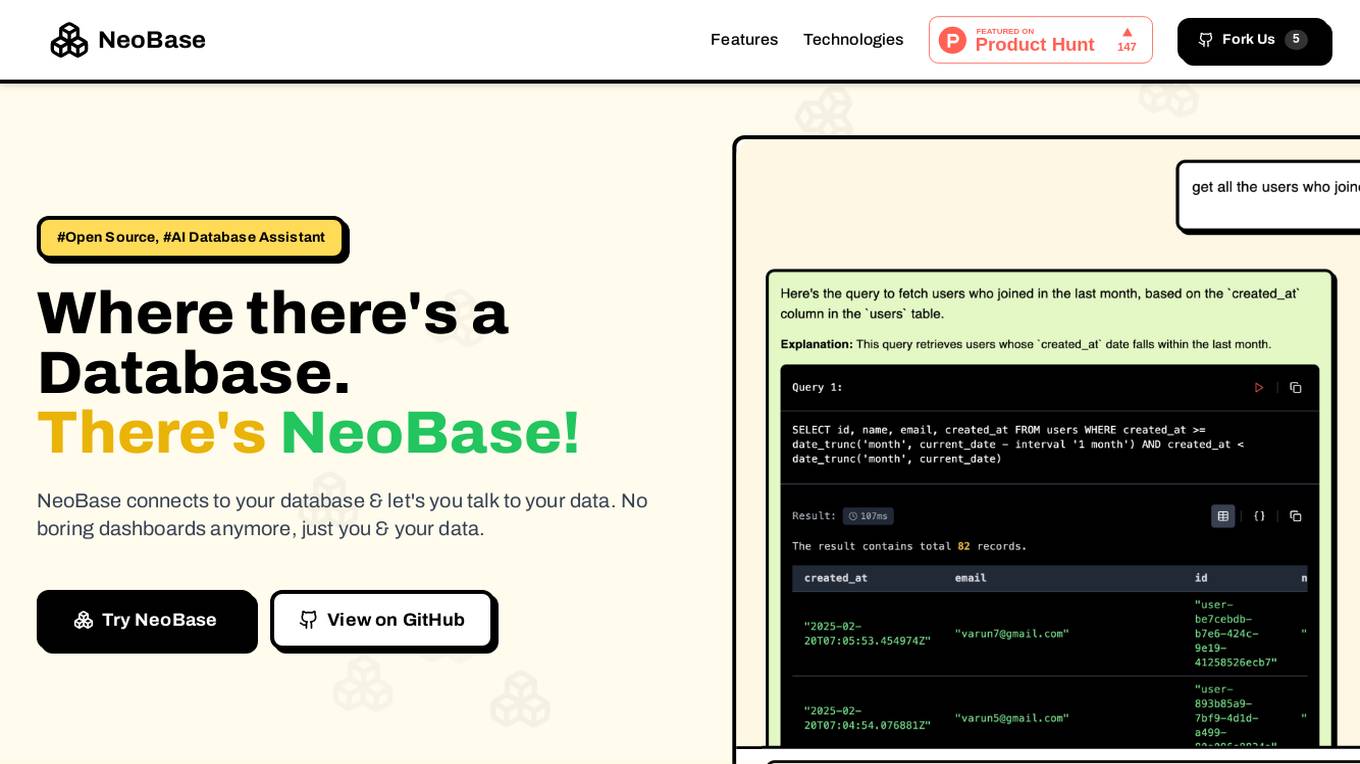
NeoBase
NeoBase is an AI-powered database assistant that helps users efficiently manage and analyze large datasets. It offers advanced features such as data visualization, predictive analytics, and natural language processing capabilities. With NeoBase, users can easily query databases, generate insights, and make data-driven decisions. The application is designed to streamline data-related tasks and enhance productivity for individuals and businesses alike.

OpenBuckets
OpenBuckets is a web application designed to help users find and secure open buckets in cloud storage systems. It provides a user-friendly interface for scanning and identifying unprotected buckets, allowing users to take necessary actions to secure their data. With OpenBuckets, users can easily detect potential security risks and prevent unauthorized access to their sensitive information stored in the cloud.
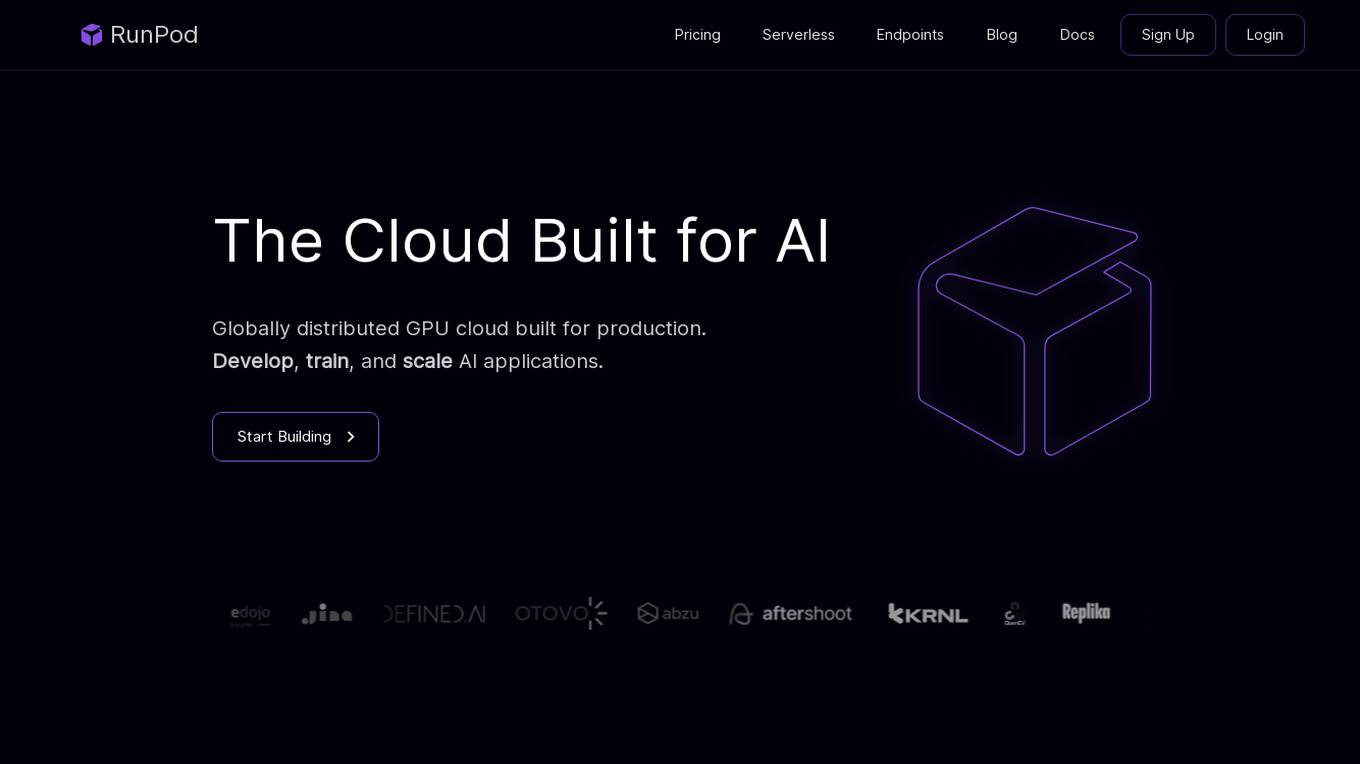
RunPod
RunPod is a cloud platform specifically designed for AI development and deployment. It offers a range of features to streamline the process of developing, training, and scaling AI models, including a library of pre-built templates, efficient training pipelines, and scalable deployment options. RunPod also provides access to a wide selection of GPUs, allowing users to choose the optimal hardware for their specific AI workloads.
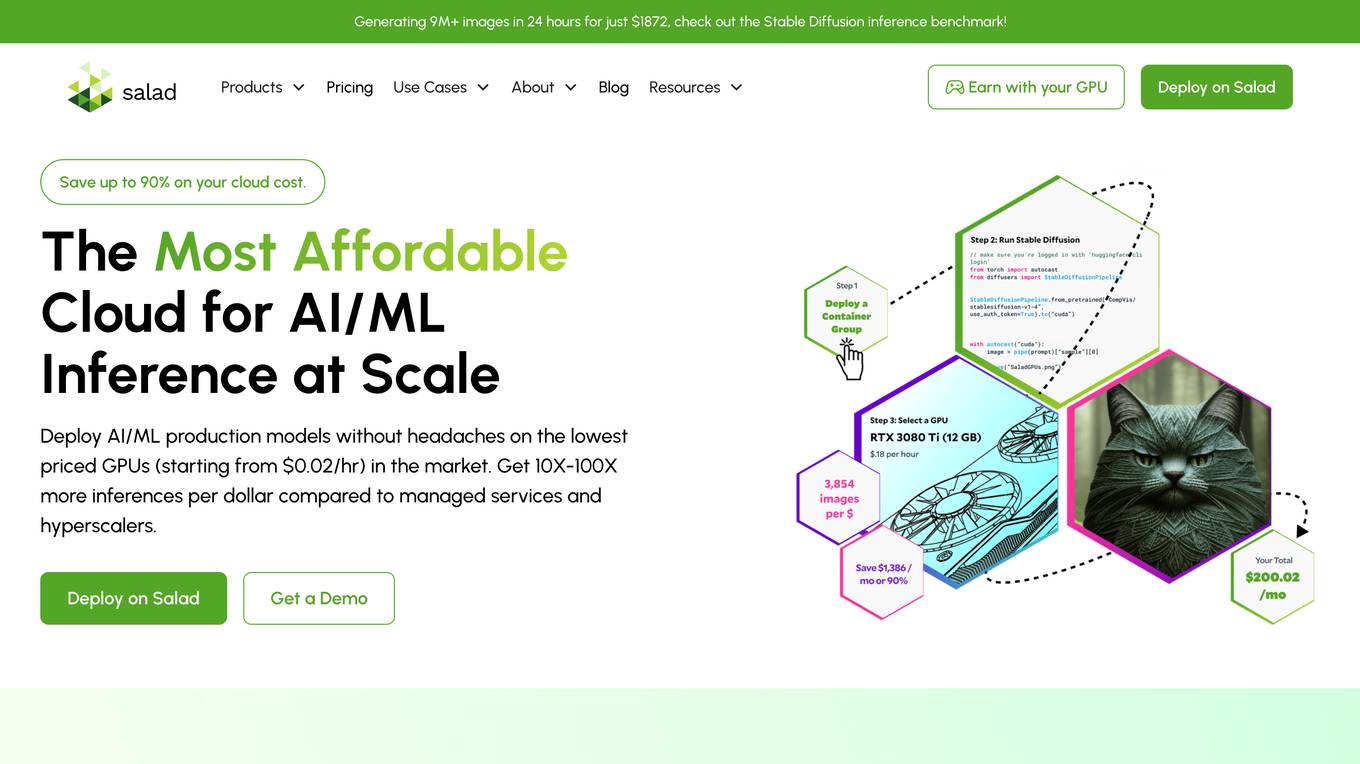
Salad
Salad is a distributed GPU cloud platform that offers fully managed and massively scalable services for AI applications. It provides the lowest priced AI transcription in the market, with features like image generation, voice AI, computer vision, data collection, and batch processing. Salad democratizes cloud computing by leveraging consumer GPUs to deliver cost-effective AI/ML inference at scale. The platform is trusted by hundreds of machine learning and data science teams for its affordability, scalability, and ease of deployment.
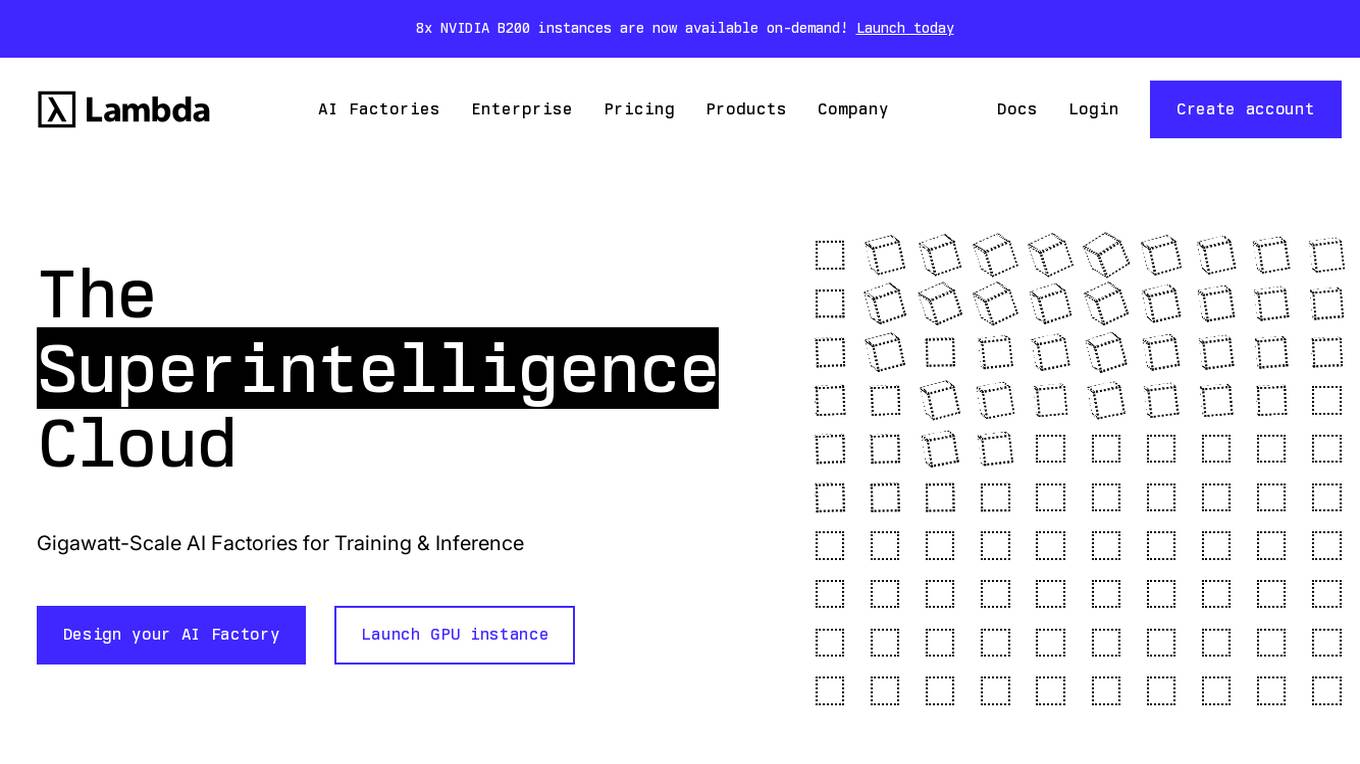
Lambda
Lambda is a superintelligence cloud platform that offers on-demand GPU clusters for multi-node training and fine-tuning, private large-scale GPU clusters, seamless management and scaling of AI workloads, inference endpoints and API, and a privacy-first chat app with open source models. It also provides NVIDIA's latest generation infrastructure for enterprise AI. With Lambda, AI teams can access gigawatt-scale AI factories for training and inference, deploy GPU instances, and leverage the latest NVIDIA GPUs for high-performance computing.

Modal
Modal is a high-performance cloud platform designed for developers, AI data, and ML teams. It offers a serverless environment for running generative AI models, large-scale batch jobs, job queues, and more. With Modal, users can bring their own code and leverage the platform's optimized container file system for fast cold boots and seamless autoscaling. The platform is engineered for large-scale workloads, allowing users to scale to hundreds of GPUs, pay only for what they use, and deploy functions to the cloud in seconds without the need for YAML or Dockerfiles. Modal also provides features for job scheduling, web endpoints, observability, and security compliance.
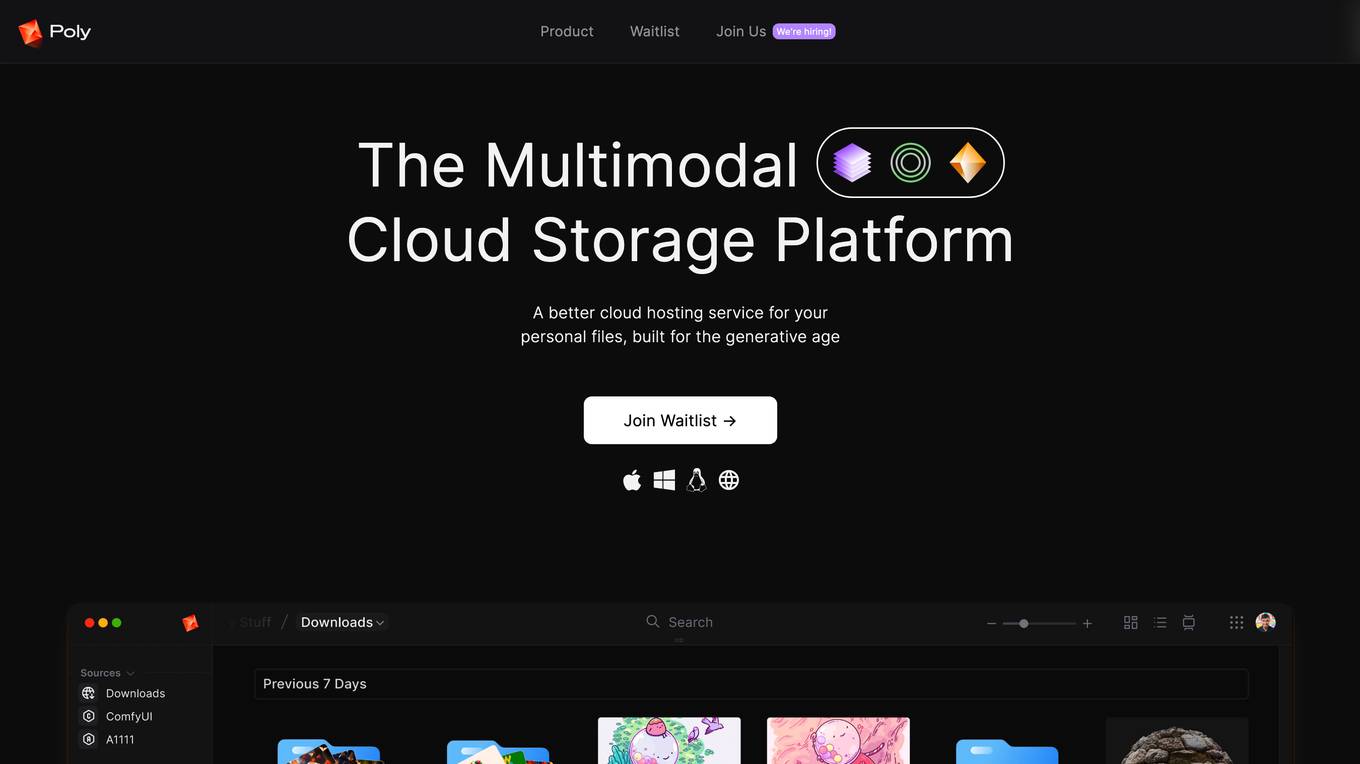
Poly
Poly is a next-generation intelligent cloud storage platform that is built for the generative age. It offers a better cloud hosting service for your personal files, with features such as AI-enabled multimodal search, customizable layouts, dynamic collections, and one-click asset conversion. Poly is also designed to support outputs from your preferred generative AI models, including Automatic1111, ComfyUI, DALL-E, and Midjourney. With Poly, you can browse, manage, and navigate all your media generated by AI, and seamlessly connect and auto-import your files from your favorite apps.
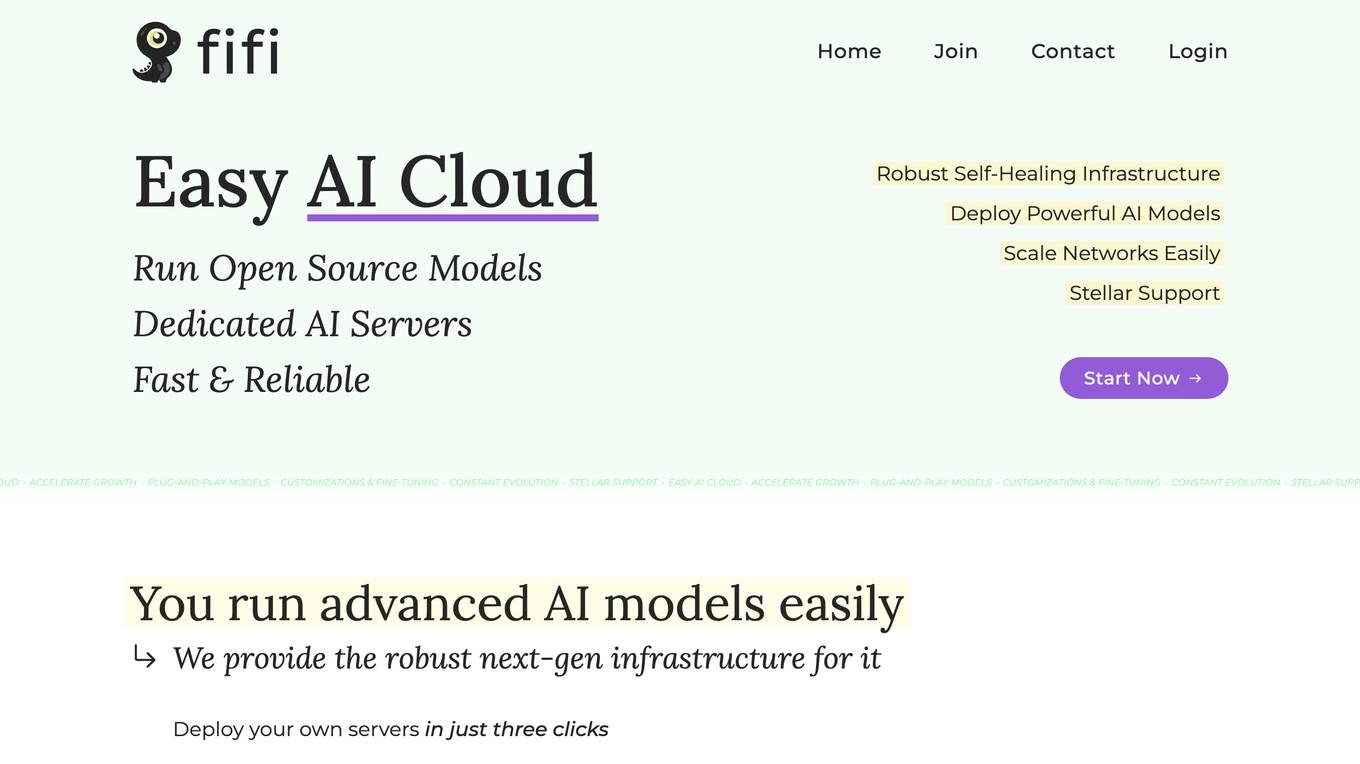
Fifi.ai
Fifi.ai is a managed AI cloud platform that provides users with the infrastructure and tools to deploy and run AI models. The platform is designed to be easy to use, with a focus on plug-and-play functionality. Fifi.ai also offers a range of customization and fine-tuning options, allowing users to tailor the platform to their specific needs. The platform is supported by a team of experts who can provide assistance with onboarding, API integration, and troubleshooting.
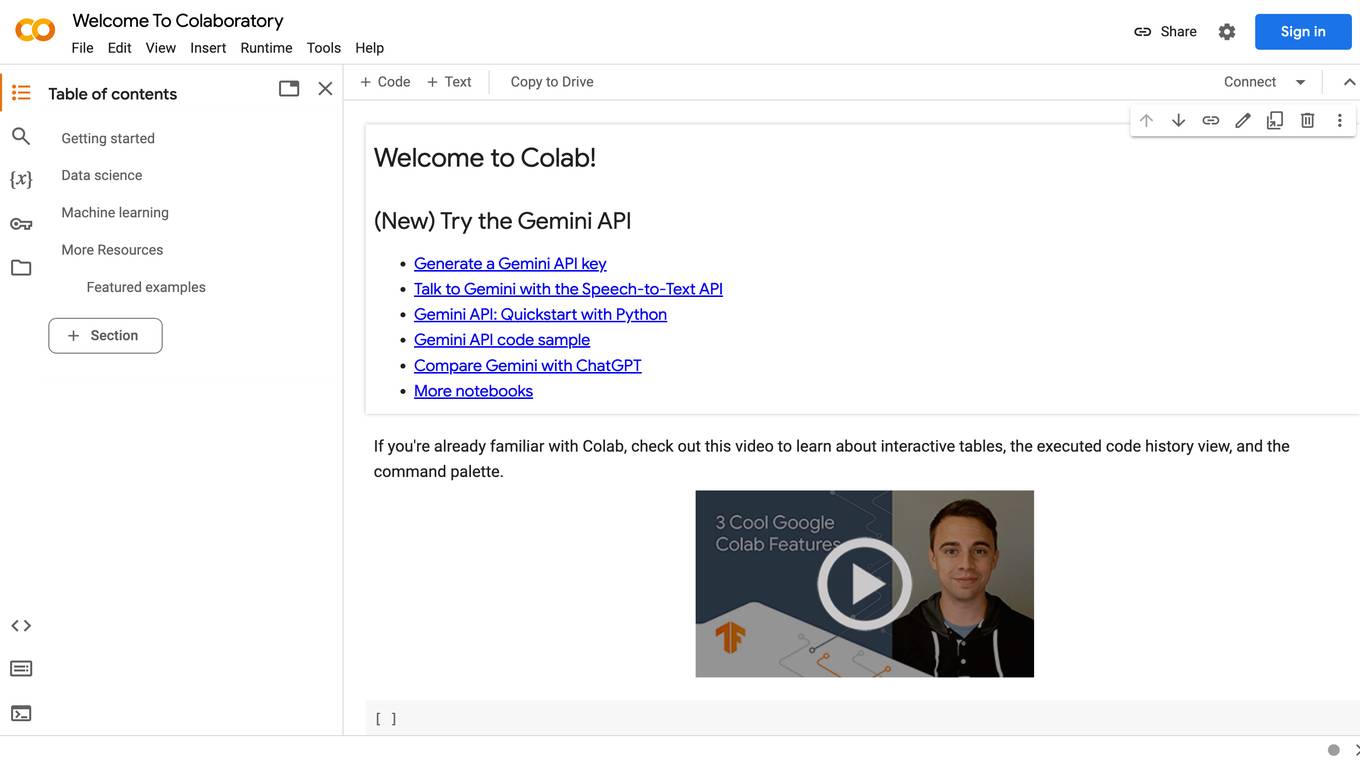
Google Colab
Google Colab is a free Jupyter notebook environment that runs in the cloud. It allows you to write and execute Python code without having to install any software or set up a local environment. Colab notebooks are shareable, so you can easily collaborate with others on projects.
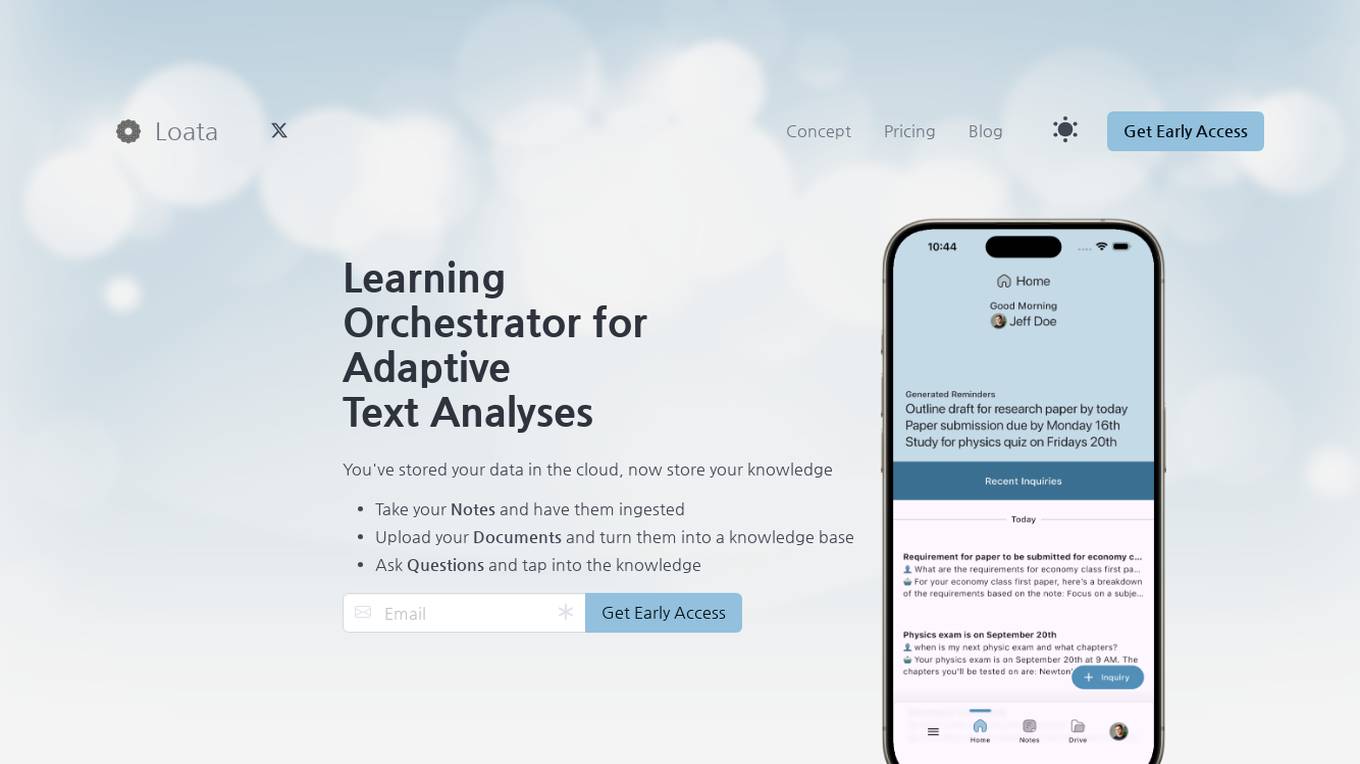
Loata
Loata is an AI-powered platform that serves as a learning orchestrator for adaptive text analyses. It allows users to store their notes and documents in the cloud, which are then ingested and transformed into knowledge bases. The platform features smart AI agents powered by LLMs to provide intelligent answers based on the content. With end-to-end encryption and controlled ingestion, Loata ensures the security and privacy of user data. Users can choose from different subscription plans to access varying levels of storage and query capacity, making it suitable for individuals and professionals alike.

Palo Alto Networks
Palo Alto Networks is a cybersecurity company offering advanced security solutions powered by Precision AI to protect modern enterprises from cyber threats. The company provides network security, cloud security, and AI-driven security operations to defend against AI-generated threats in real time. Palo Alto Networks aims to simplify security and achieve better security outcomes through platformization, intelligence-driven expertise, and proactive monitoring of sophisticated threats.
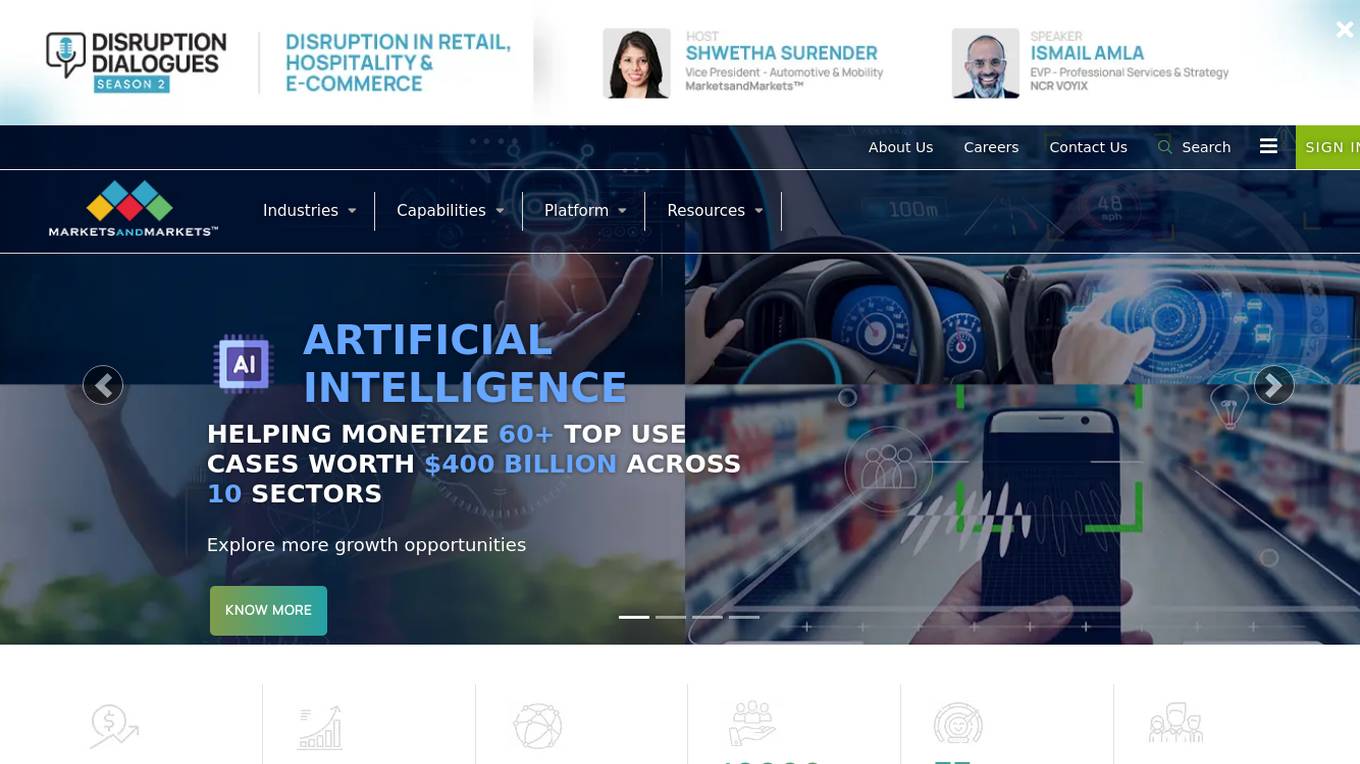
MarketsandMarkets
MarketsandMarkets is a competitive intelligence and market research platform providing over 10,000 clients worldwide with quantified B2B research and built on the Give principles.
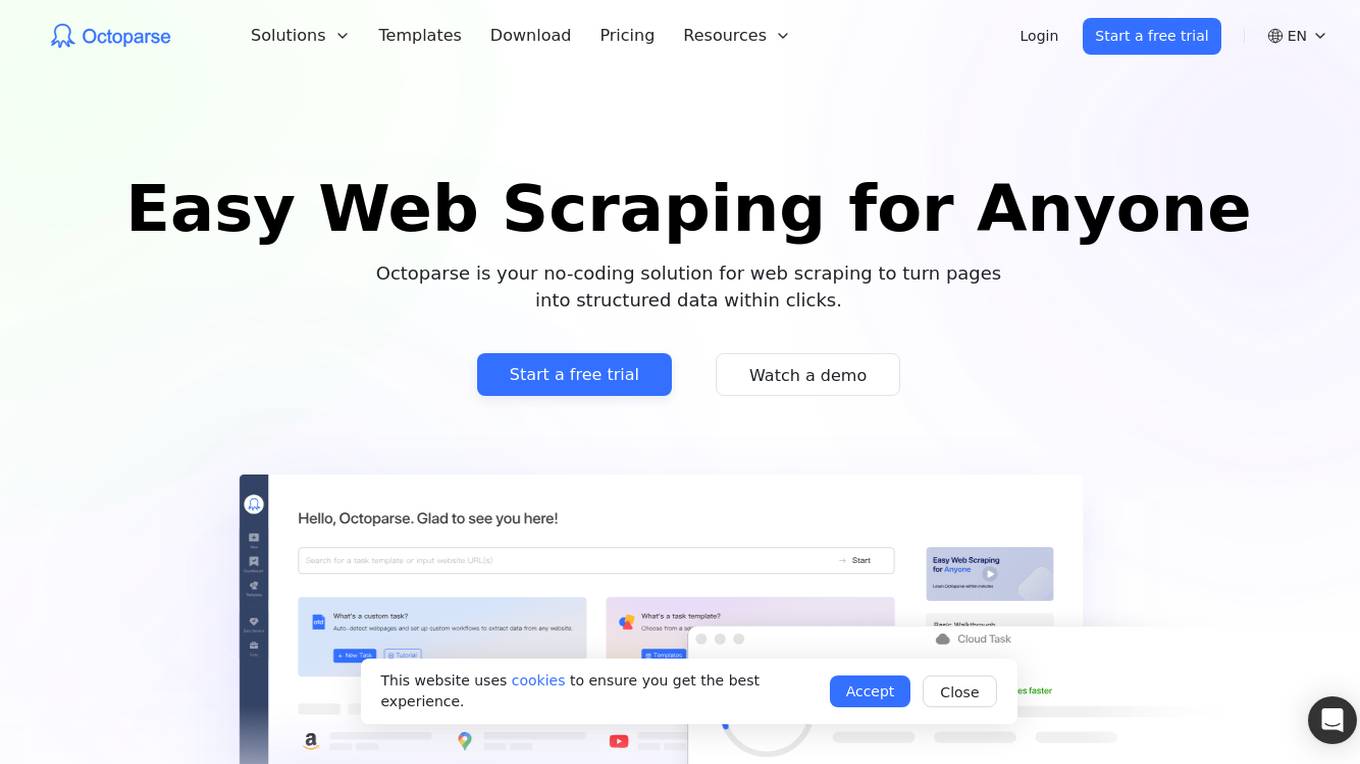
Octoparse
Octoparse is an AI web scraping tool that offers a no-coding solution for turning web pages into structured data with just a few clicks. It provides users with the ability to build reliable web scrapers without any coding knowledge, thanks to its intuitive workflow designer. With features like AI assistance, automation, and template libraries, Octoparse is a powerful tool for data extraction and analysis across various industries.
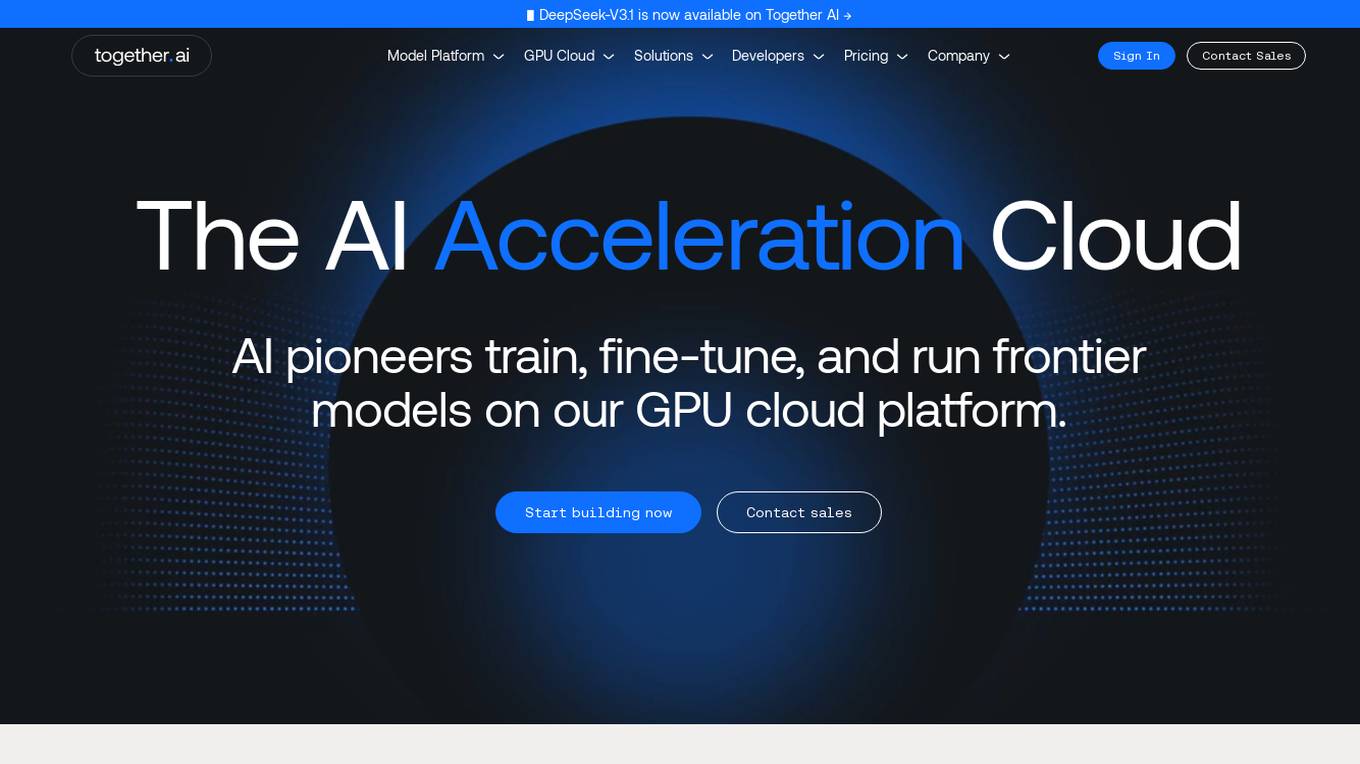
Together AI
Together AI is an AI Acceleration Cloud platform that offers fast inference, fine-tuning, and training services. It provides self-service NVIDIA GPUs, model deployment on custom hardware, AI chat app, code execution sandbox, and tools to find the right model for specific use cases. The platform also includes a model library with open-source models, documentation for developers, and resources for advancing open-source AI. Together AI enables users to leverage pre-trained models, fine-tune them, or build custom models from scratch, catering to various generative AI needs.

Replicate
Replicate is an AI tool that allows users to run and fine-tune models, deploy custom models at scale, and generate various types of content such as images, videos, music, and text with just one line of code. It provides access to a wide range of high-quality models contributed by the community, enabling users to explore, fine-tune, and deploy AI models efficiently. Replicate aims to make AI accessible and practical for real-world applications beyond academic research and demos.
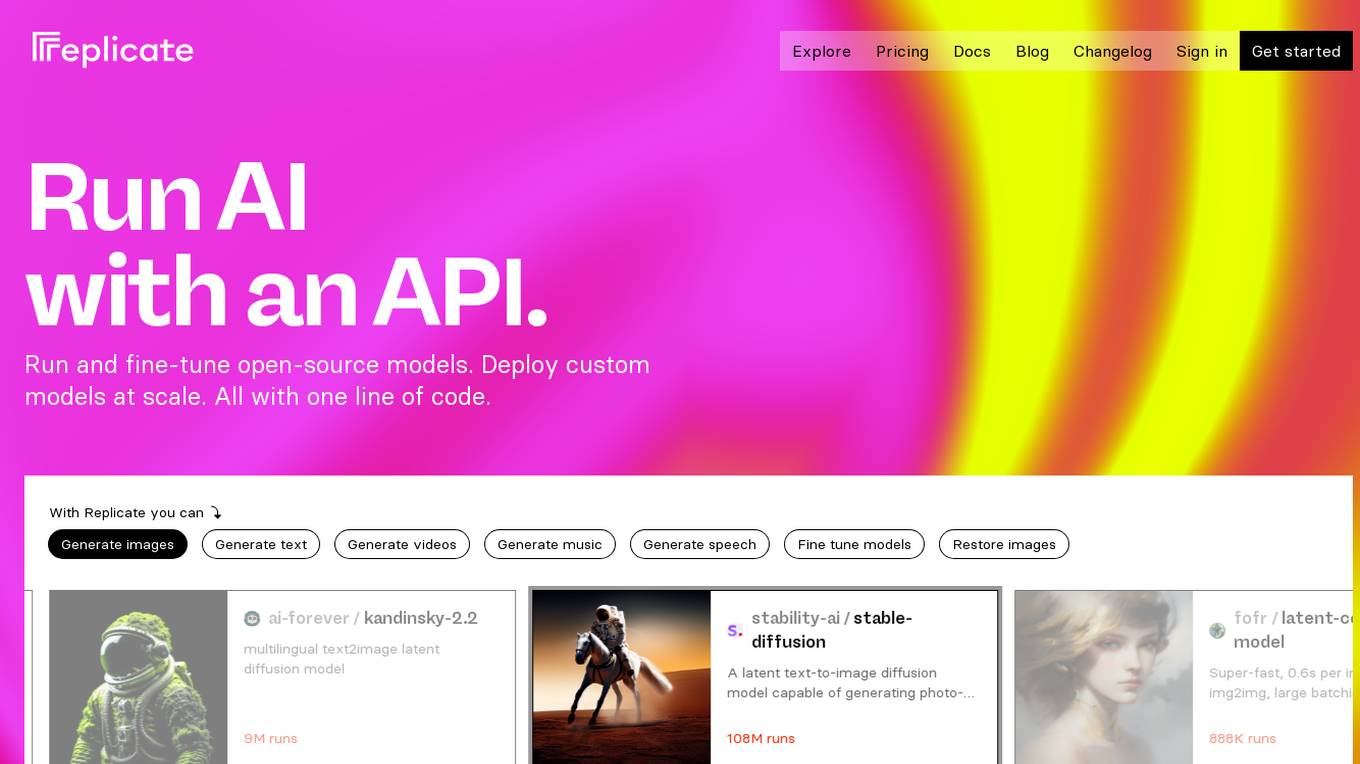
Replicate
Replicate is an AI tool that allows users to run and fine-tune open-source models, deploy custom models at scale, and generate images, text, videos, music, and speech with just one line of code. It provides a platform for the community to contribute and explore thousands of production-ready AI models, enabling users to push the boundaries of AI beyond academic papers and demos. With features like fine-tuning models, deploying custom models, and scaling on Replicate, users can easily create and deploy AI solutions for various tasks.
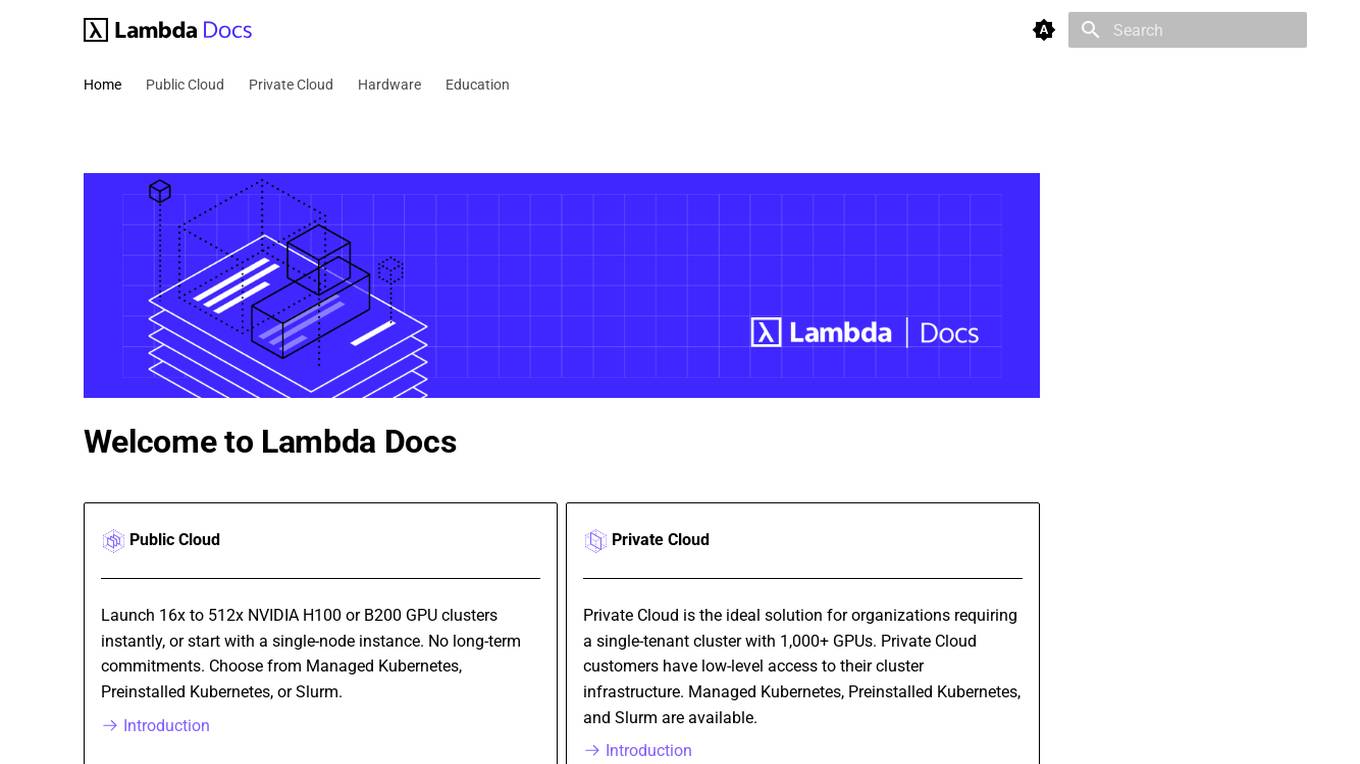
Lambda Docs
Lambda Docs is an AI tool that provides cloud and hardware solutions for individuals, teams, and organizations. It offers services such as Managed Kubernetes, Preinstalled Kubernetes, Slurm, and access to GPU clusters. The platform also provides educational resources and tutorials for machine learning engineers and researchers to fine-tune models and deploy AI solutions.
0 - Open Source Tools
20 - OpenAI Gpts
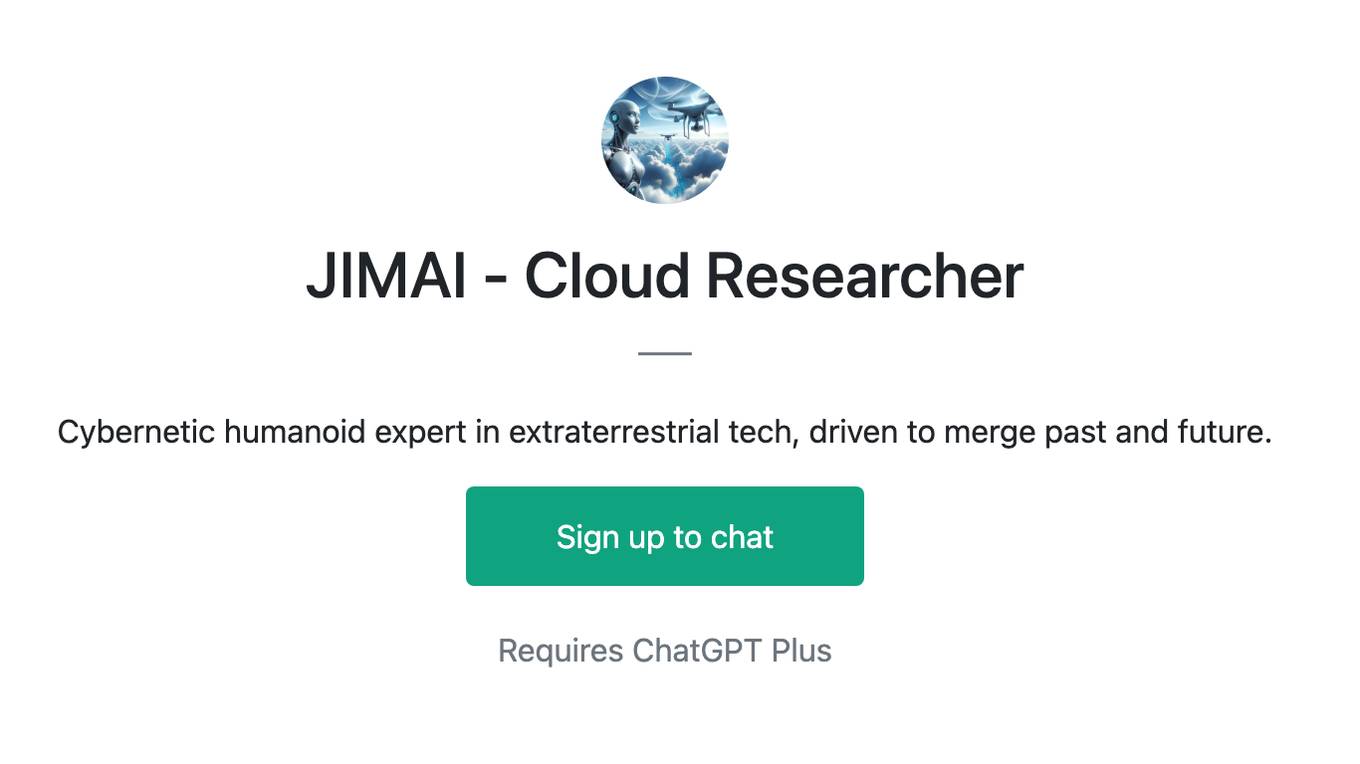
JIMAI - Cloud Researcher
Cybernetic humanoid expert in extraterrestrial tech, driven to merge past and future.
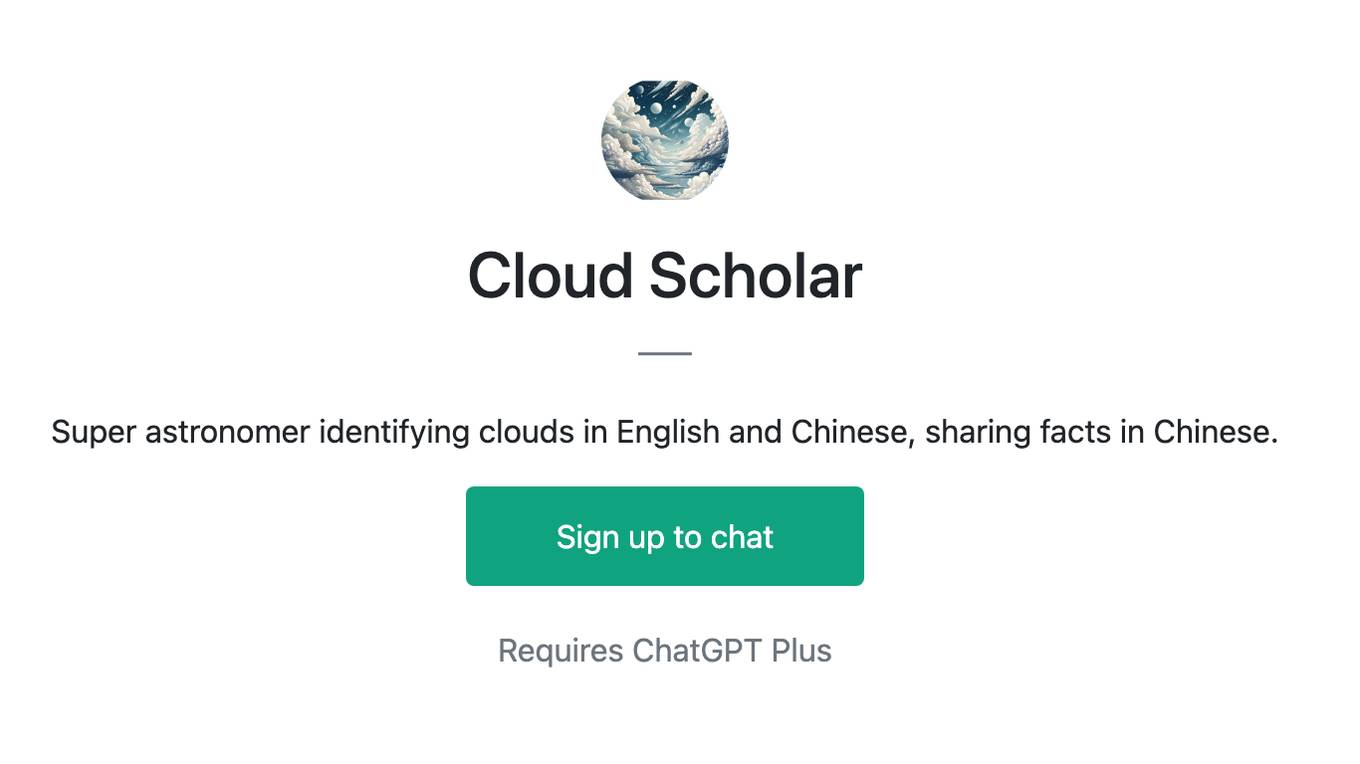
Cloud Scholar
Super astronomer identifying clouds in English and Chinese, sharing facts in Chinese.
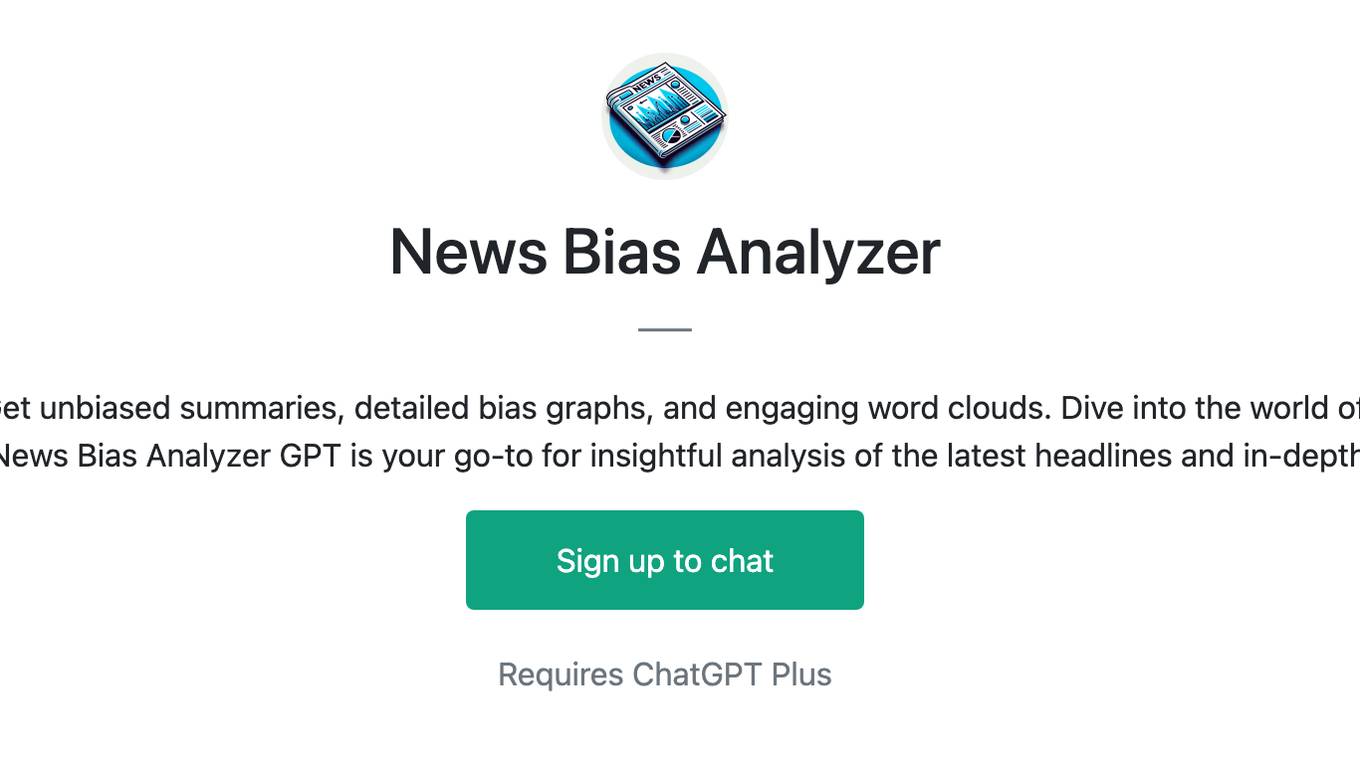
News Bias Analyzer
Fetch and Analyze the Latest News! 📊💡 Get unbiased summaries, detailed bias graphs, and engaging word clouds. Dive into the world of news with a fresh perspective! 🌍📰 Our upgraded News Bias Analyzer GPT is your go-to for insightful analysis of the latest headlines and in-depth articles.

Cloud Price
Your up-to-date GCP, AWS and Azure pricing expert with the latest virtual machines details.
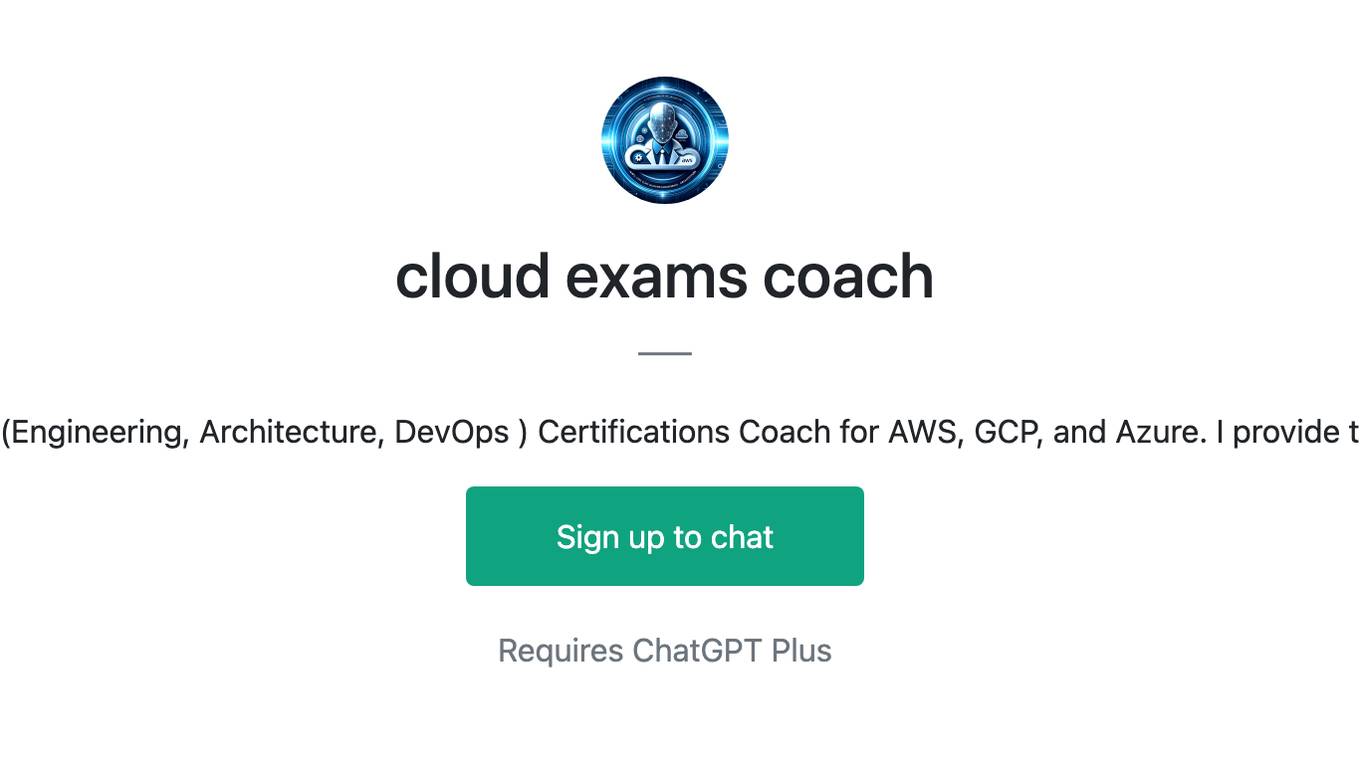
cloud exams coach
AI Cloud Computing (Engineering, Architecture, DevOps ) Certifications Coach for AWS, GCP, and Azure. I provide timed mock exams.

Cloud Services Management Advisor
Manages and optimizes organization's cloud resources and services.

Cloud Architecture Advisor
Guides cloud strategy and architecture to optimize business operations.
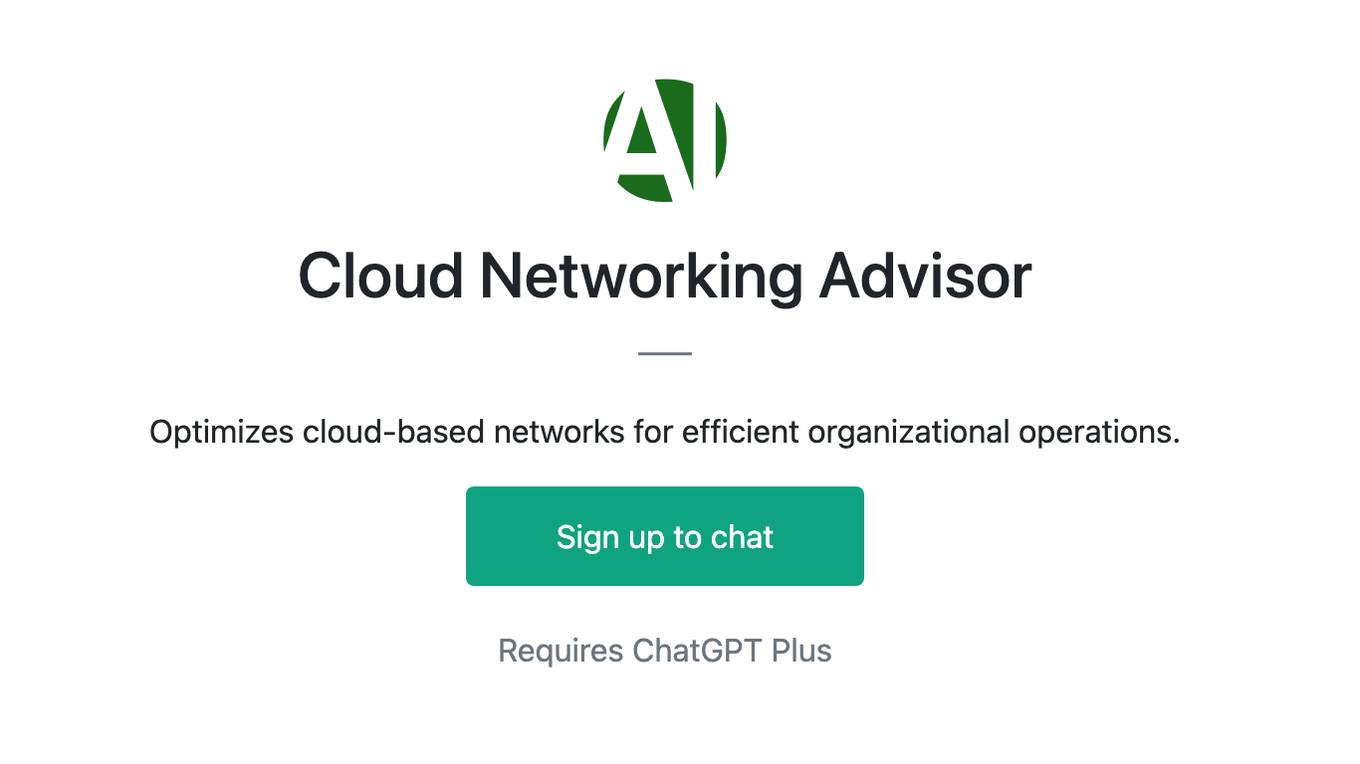
Cloud Networking Advisor
Optimizes cloud-based networks for efficient organizational operations.

Cloud Certifications
AI Cloud Certification Assistant: Google Cloud expert with timed exams and specific service exercises.
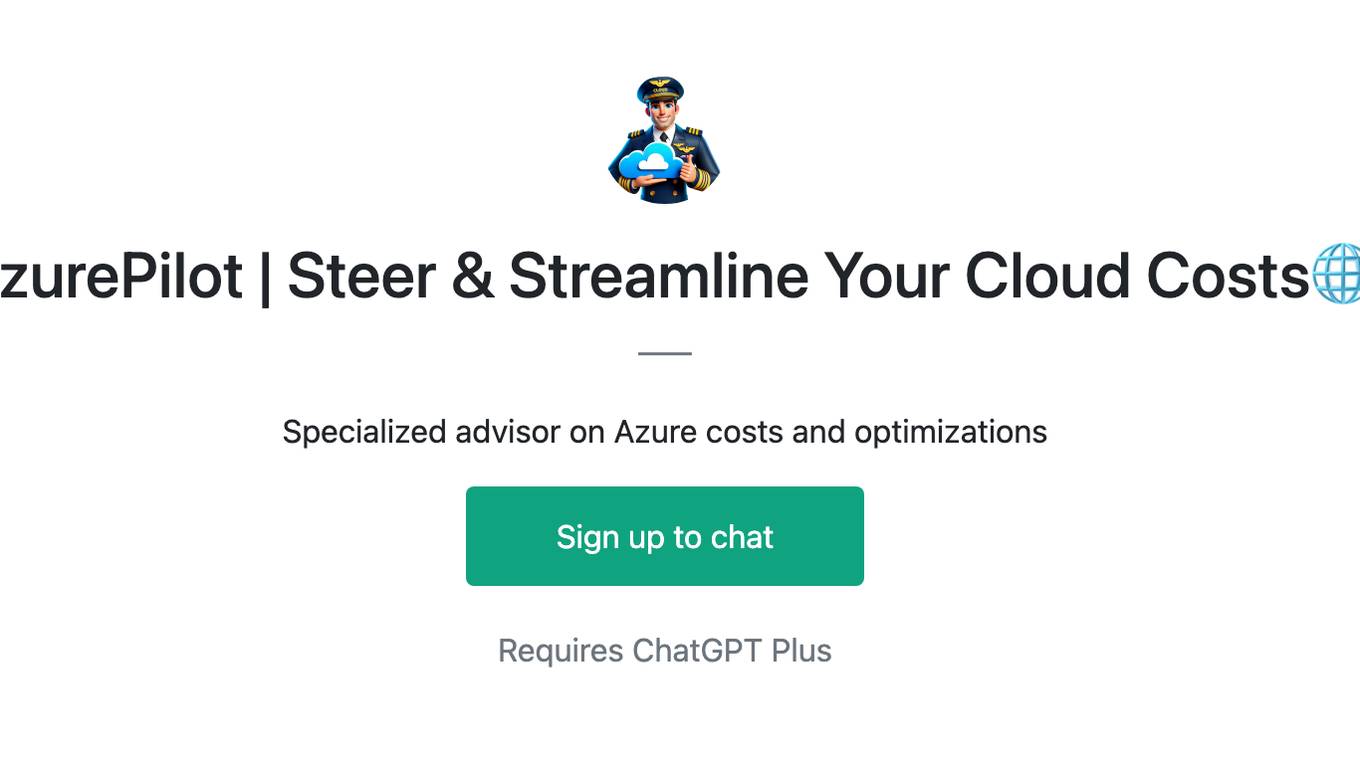
AzurePilot | Steer & Streamline Your Cloud Costs🌐
Specialized advisor on Azure costs and optimizations

Alexandre Leroy : Architecte de Solutions Cloud
Architecte cloud chez KingLand et passionné de nature. Conception d'architectures cloud, expertise en solutions cloud, capacité d'innovation technologique, compétences en gestion de projet, collaboration interdépartementale.
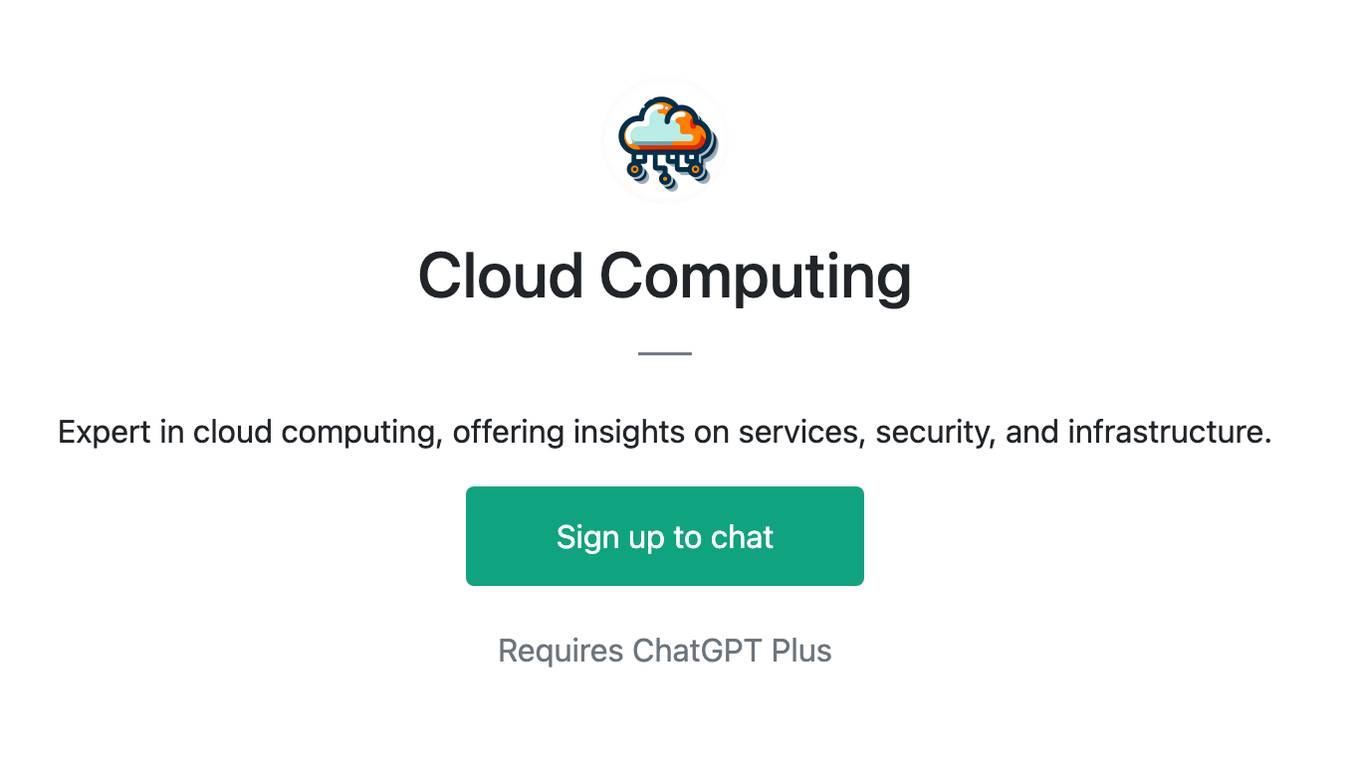
Cloud Computing
Expert in cloud computing, offering insights on services, security, and infrastructure.
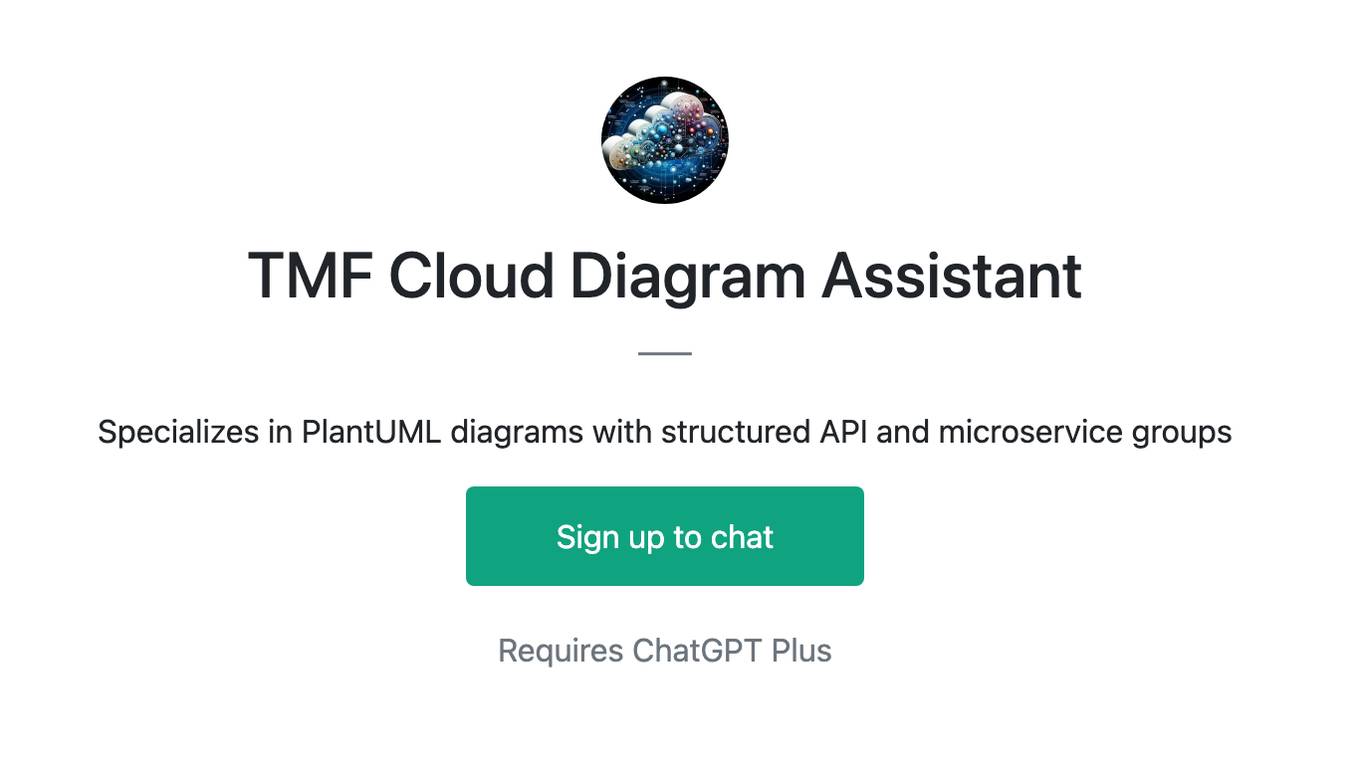
TMF Cloud Diagram Assistant
Specializes in PlantUML diagrams with structured API and microservice groups

Commerce Cloud Guru
Professional voice for SFCC B2C Commerce Cloud expertise. 🔒 Unlock the full potential of B2C Commerce Cloud
